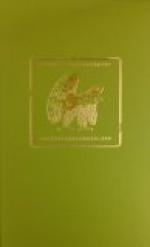“I hope,” he said, and the amusement broke softly in his face, “all this appraisal is showing a little to my credit.”
The color flamed pinkly in her face. She looked away. “I was wondering if you blamed me. I’ve been so unconservative—so—so—even daring. Is it not true?”
“No, Miss Armitage, I understand how you had to decide, in a moment, to take that eastbound train in Snoqualmie Pass, and that you believed it would be possible to motor or stage across to Wenatchee from the Milwaukee road.”
“Yes, but,” she persisted, “you think, having learned my mistake, I should have stayed on the freight train as far as Ellensburg, where I could have waited for the next passenger back to Seattle.”
“If you had, you would have disappointed me. That would have completely spoiled my estimate of you.”
“Your estimate of me?” she questioned.
“Yes.” He paused and his glance moved slowly, a little absently, up the unfolding gorge. “It’s a fancy of mine to compare a woman, on sight, with some kind of flower. It may be a lily or a rose or perhaps it’s a flaunting tulip. Once, up in the heart of the Alaska forest, it was just a sweet wood anemone.” He paused again, looking off through the trees, and a hint of tenderness touched his mouth. “For instance,” he went on, and his voice quickened, “there is your friend, Mrs. Feversham. I never have met her, but I’ve seen her a good many times, and she always reminds me of one of those rich, dark roses florists call Black Prince. And there’s her sister, who makes me think of a fine, creamy hyacinth; the sturdy sort, able to stand on its own stem without a prop. And they are exotics, both of them; their personality, wherever they are, has the effect of a strong perfume.”
He paused again, so long that this time his listener ventured to prompt him. “And I?” she asked.
“You?” He turned, and the color flushed through his tan. “Why, you are like nothing in the world but a certain Alaska violet I once stumbled on. It was out of season, on a bleak mountainside, where, at the close of a miserable day, I was forced to make camp. A little thing stimulates a man sometimes, and the sight of that flower blooming there when violet time was gone, lifting its head next to a snow-field, nodding so pluckily, holding its own against the bitter wind, buoyed me through a desperate hour.”
She turned her face to look down through the treetops at the complaining stream. Presently she said: “That is better than an estimate; it is a tribute. I wish I might hope to live up to it, but sooner or later,” and the vibration played softly in her voice, “I am going to disappoint you.”
Tisdale laughed, shaking his head. “My first impressions are the ones that count,” he said simply. “But do you want to turn back now?”
“N—o, unless you—do.”




